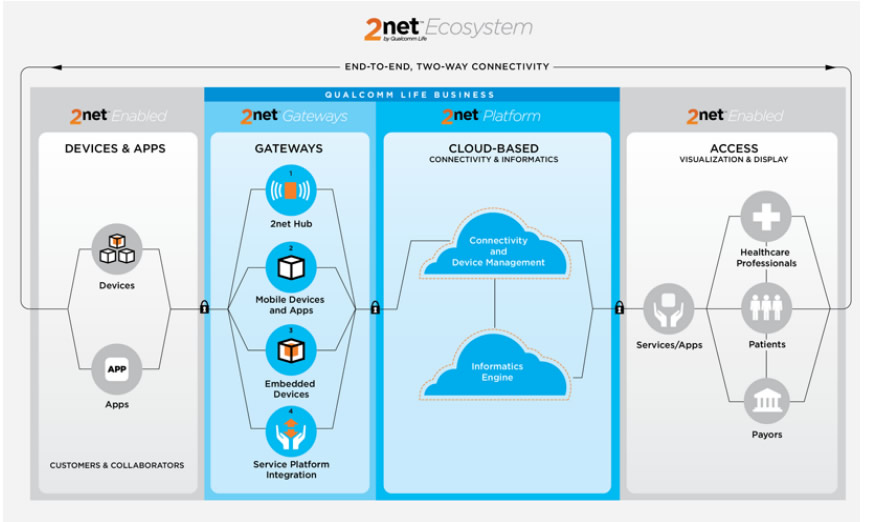As the medical mobile cloud begins to emerge, we are seeing the advent of cloud platforms for mobile medical applications and storage. A number of these are offered by major companies.
Qualcomm has a made a major entry into the cloud-based management of healthcare information through Qualcomm Life and its 2Net platform. The company describes 2Net as:
“The 2net™ Platform from Qualcomm Life is truly novel, offering a set of wireless health solutions that can elegantly and reliably capture and deliver medical device data to integrated portals or databases from nearly ANY customers’ or collaborators’ wireless medical device for storage in a system designed for security. It’s a whole new way of connecting devices and liberating biometric data so that it becomes ubiquitous across the continuum of care.”
The platform is cloud-based system and can be accessed from a variety of sources:
- A hub – 2net Hub – supplied by Qualcomm and used by the patient
- Medical devices which have cellular transmission capacity
- Mobile phones
- Via an integrated link to a Qualcomm partner’s platform, using an API
Data is transferred through a 3G link to the 2net platform and then transferred to the device manufacturer’s interface where it can be accessed by doctors, patients, insurers and others.
The following is a schematic diagram of the service platform.
[lightbox type=”image” src=”https://www.mobilecloudera.com/wp-content/uploads/2013/03/qualcom.jpg”] [/lightbox]
[/lightbox]
Qualcomm has already enlisted a number of partners and it divides its solution-based partners into the following categories:
- Fitness Medical Devices
- Service Providers
- Healthcare Providers
- Software Applications
Qualcomm asserts that the major benefit of its platform, and its attraction to partners in the medical information field is that it solves the complexities of establishing a mobile connectivity solution, which are substantial, “due to technology selection errors, unscalable deployment models and prohibitively high operational support costs.”
Microsoft initiated its HealthVault in 2007, as a cloud-based storage for personal health records (PHR). The general idea is, “get your medical records in one place.” It now has 127 apps providers (insurers, pharmacies, health provider organizations and others) as well as 223 device providers as partners.
It should be noted that Google had a similar platform, Google Health, which it discontinued (and deleted all information as of 1/1/13.)
